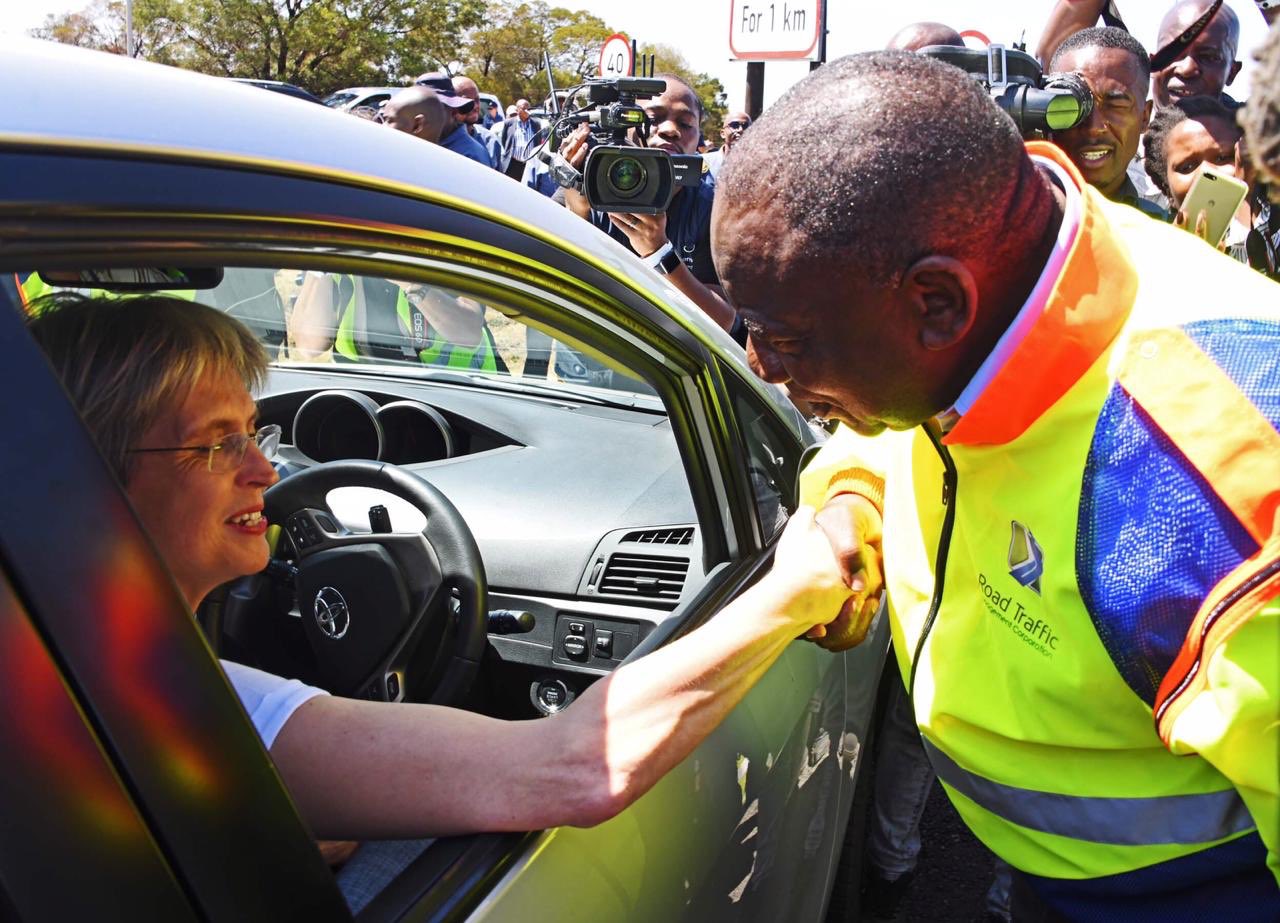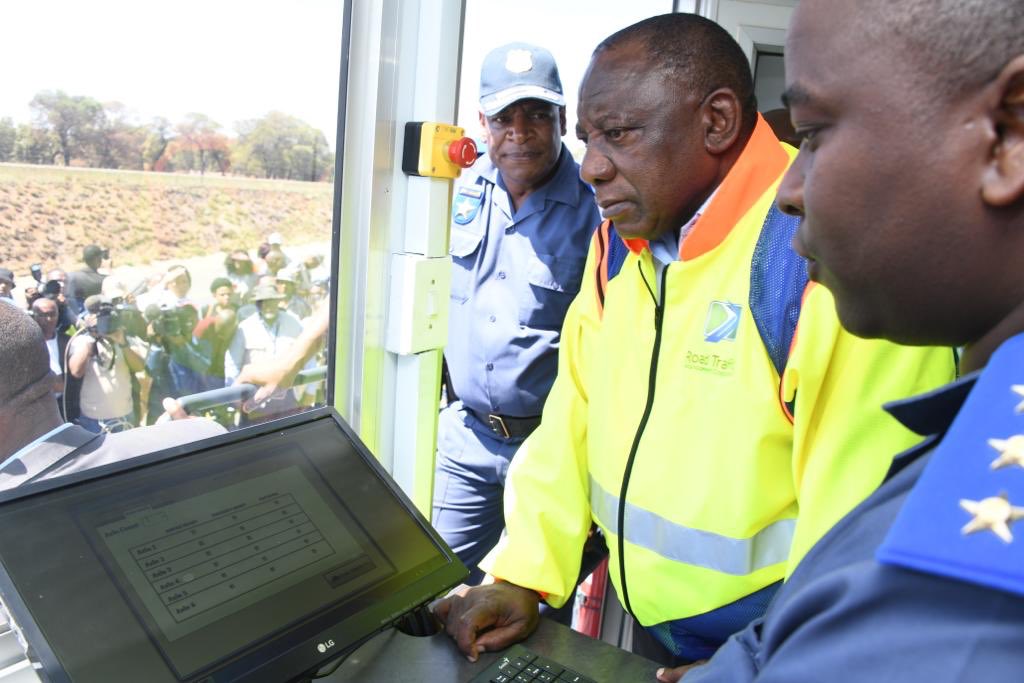Riyaz Patel
President Cyril Ramaphosa interacted with motorists and passengers on the N3, near Heidelberg while launching national Transport Month Saturday.
He said the N3 motorway is one of the most important economic arteries in South Africa, but lamented that irresponsible and reckless road behaviour on the country’s roads are costing the country in dearly, both in terms of human lives lost as well the economic losses.
“Safer roads begin with what we think, feel and do as we begin our journeys as pedestrians, drivers, passengers or cyclists.”
“It pains me that our country continues to experience around 14,000 road deaths a year… Such accidents cost the country an estimated R147 billion each year.”
South Africa’s roads won’t become safer unless we change our attitudes as road users, said Ramaphosa.

“Safer roads do not begin with more police and greater enforcement. Safer roads begin with what we think, feel and do as we begin our journeys as pedestrians, drivers, passengers or cyclists,” he pointed out. “
President Ramaphosa said the Administrative Adjudication of Road Traffic Offences – or AARTO – Act is but one of government’s interventions which introduces meaningful consequences for reckless, negligent and inconsiderate conduct on the country’s roads.
He said the apartheid design of South Africa’s cities, towns and rural areas meant that the majority people lived far from work, educational opportunities and other services.
To this day, Ramaphosa said, the high transports costs “contribute to the impoverishment of our people,” and the distances that need to be travelled limits economic productivity and growth.
“Today, as we mark 14 years since the launch of October Transport Month in 2005, we can point to important progress in developing integrated public transport systems that connect our major economic hubs and townships.”
He said millions of commuters are benefiting from integrated public transport in metros such as Johannesburg, Tshwane, Ekurhuleni and Cape Town.

With the growth in urbanisation, President Ramaphosa said, government must be prepared for future challenges as many more people move to urban areas.
“This will place greater strain on our transport infrastructure, lead to more congestion on our roads and require more enforcement capacity.
“As cities grow, as informal settlements spread further away from urban centres, the need for integrated developmental planning becomes ever more important, he said.
The President briefly touched on a number of other strategic road projects which are in various stages of implementation.
“We are currently in the process of implementing the Moloto Corridor development north east of Pretoria where we are enhancing commuter and traffic safety while developing viable economic projects along this important transit route.”

The Moloto Road stretches over 160km, spans three provinces – Gauteng, Mpumalanga and Limpopo – and is used by over 60,000 commuters daily.
Elsewhere in the country, Ramaphosa spoke about upgrades on the N7 Olifants River Bridge in the Western Cape, strategic to the movement of people and goods between South Africa and Namibia.
With the growth in urbanisation, our government must be prepared for future challenges as many more people move to urban areas.
This will place greater strain on our transport infrastructure, lead to more congestion on our roads and require more enforcement capacity.
As cities grow, as informal settlements spread further away from urban centres, the need for integrated developmental planning becomes ever more important.
Ramaphosa urged South Africans to use public transport, share vehicles, to cycle and to walk where feasible, during this October Transport Month.
This was important not only to reduce congestion and carbon emissions, but as part of “engaging with each other as citizens who share a wonderful country.”
This freeway is also an example of the remarkable infrastructure we have been able to build and maintain during our 25 years of freedom and democracy.
However, we are also here today to acknowledge the tragic human and economic cost inflicted by collisions and other accidents along this freeway and roadways around our country.
With us today are survivors of such accidents and people who have experienced loss in their family or among colleagues.
We offer all of you our heartfelt sympathy and support, and the commitment that government and all sectors of society will work together to achieve a change in road user behaviour.
Safer roads begin with providing safe and comfortable transport for workers, instead of bundling large numbers of people onto the backs of exposed vehicles, in clear disregard of the value of life or in violation of our law.
Safer roads begin with checking our vehicles and keeping them off the road if they are not roadworthy.
Safer roads begin with understanding that no-one owns the road, and that roads are stretches of infrastructure we share as citizens for our common benefit.
Safer roads begin with mutual respect between law enforcement officers and road-users.
We all have a right to safety and it is up to each of us to create that safety through our own conduct.
It is up to each of us not to drink and drive. Ever.
It is through our individual sense of responsibility that all of us will arrive alive, uninjured and without any infringements, fines or judgments against our names, all of the time.
There should be no need for families to plant crosses and place flowers along our sidewalks and roadsides.
It pains me that our country continues to experience around 14,000 road deaths a year.
In addition to the immense human cost of fatal accidents, there is a significant economic cost.
Such accidents cost the country an estimated R147 billion each year.
We must arrest this dire situation for the sake of preserving the health of our people and the productivity of our country.
In recognition of these challenges, South Africa has committed itself to the United Nations Decade of Action for Road Safety, which seeks to reduce road fatalities and injuries.
As part of this commitment, government has introduced several measures that will usher in a fundamental change in the manner in which road traffic safety issues are addressed.
The Administrative Adjudication of Road Traffic Offences – or AARTO – Act is one of the interventions to forge a more effective and efficient link between enforcement and a transparent and fair adjudication process.
The Act promotes responsible behaviour on our roads through the creation of a demerit system, which introduces meaningful consequences for reckless, negligent and inconsiderate conduct.
With this, South Africa is joining a growing number of countries worldwide where the consequences of infringements and offences are felt in the pockets, livelihoods and lives of those who break the law.
Programme Director,
Our roads are an important part of the national transport system we want.
Before the dawn of democracy in 1994, our country did not have a cohesive integrated public transport system.
Transport infrastructure served a minority of South Africans in an economy that was isolated, physically and politically, from world markets.
Logistics entailed connections between industrial hubs and mining areas for the purpose of ferrying goods to harbours and airports.
Elsewhere, vast swathes of our population were left unconnected and isolated in rural areas where poor roads were the lived reality of millions.
The available modes of public transport services were overstretched.
The apartheid design of our cities, towns and rural areas meant that the majority people lived far from work, educational opportunities and other services.
To this day, the cost of transport contributes to the impoverishment of our people, and the distances that need to be travelled limits economic productivity and growth.
This has an impact on the quality of life of millions of South Africans and the cohesion of families.
Today, as we mark 14 years since the launch of October Transport Month in 2005, we can point to important progress in developing integrated public transport systems that connect our major economic hubs and townships.
Millions of commuters are benefiting from integrated public transport in metros such as Johannesburg, Tshwane, Ekurhuleni and Cape Town.
These help to ensure that people can get to work safely and on time.
Even so, we remain concerned about the persistence of vandalism of public assets in various parts of the country, and commuters’ vulnerability to crime when they use public transport.
During this October Transport Month, we reinvite South Africans to use public transport, to share vehicles, to cycle and to walk where feasible, not only to reduce congestion and carbon emissions, but as part of engaging with each other as citizens who share a wonderful country.
Public transport is not just about moving us from place to place, but it is about putting us in shared spaces where we are able to build bridges between individuals and communities.
But where public transport fails, or does not exist, or is inadequate, the lives of our people cannot improve.
While the thematic month of October allows us to celebrate successes in all modes of transport, including rail, road, aviation and maritime, it also calls on us to invest in safe, reliable and affordable public transport.
The success of all modes of transport is a vital prerequisite for economic growth.
We will therefore maintain and expand our investment in transport services and infrastructure that will make life easier for individuals and investors.
We are currently in the process of implementing the Moloto Corridor development north east of Pretoria where we are enhancing commuter and traffic safety while developing viable economic projects along this important transit route.
The Moloto Road stretches over 160km, spans three provinces – Gauteng, Mpumalanga and Limpopo – and is used by over 60,000 commuters daily.
Elsewhere in the country, we are upgrading the N7 Olifants River Bridge in the Western Cape which is strategic to the movement of people and goods between South Africa and Namibia.
There is significant construction work on the N2 in KwaZulu-Natal and the upgrade of the N3 Hammersdale interchange.
This month we will be launching three bus rapid transit systems in different municipalities across the country.
These are the Harambee Pilot Rapid service from Tembisa, Kempton Park, Isando and OR Tambo, Leeto La Polokwane in Limpopo and the Go Durban BRT in Ethekwini.
We are looking to the various bus rapid transit systems to help stimulate urban regeneration by bringing poor communities closer to economic opportunities and urban areas.
Our investment in the transport sector over the years has helped transform and improve the quality of life of millions of people previously excluded from the economy.
However, we have a lot further to travel.
With the growth in urbanisation, our government must be prepared for future challenges as many more people move to urban areas.
This will place greater strain on our transport infrastructure, lead to more congestion on our roads and require more enforcement capacity.
As cities grow, as informal settlements spread further away from urban centres, the need for integrated developmental planning becomes ever more important.
We need to understand transport as an integral part of a much larger plan for the provision of infrastructure and services.
Economic growth and service delivery can only take place when we have efficient and effective transportation, which is reliable, safe and integrated.
In this October Transport Month, let us affirm our commitment to work together to build such a transport system.
For its part, government will continue to invest in innovative ways to grow the transport sector, to improve people’s lives, and build a more prosperous and inclusive society.
